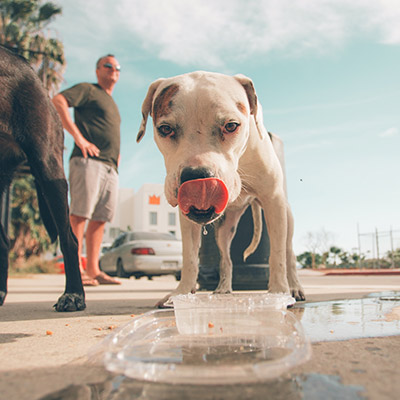 PREMIUM DIET:
PREMIUM DIET:
Although domestic dogs can survive on grain-based foods, they do best on food high in animal proteins. So give your puppy/dog a food whose first listed ingredient is a high-quality animal protein, such as chicken meal or lamb meal (meal means meat cooked, ground up, nothing but meat).
Your dog's food should always include these first two ingredient -- The first should always be a lamb meal, chicken meal or beef meal. The second should be white or brown rice. If these are not the first two ingredients it's time to switch their food for one with higher nutritional value. Learn more about feeding a premium diet HERE.
PUPPY'S NUTRITION:
Your dogs first 12 to 14 months are critical in establishing a foundation for a healthy life. Fortunately, it's easy to provide top-notch nutrition to puppies and dogs.
You want to feed puppies a food specifically formulated for their special needs. To sustain proper growth, puppies require a certain percentage of protein and fat and optimal levels of particular minerals and vitamins (which differ from the ideal levels for adult dogs). It is extremely important that these nutrients be consistent. That's why high quality puppy foods are most important to getting the puppy a great start in life. With premium diets for puppies and large breed puppies, each batch is formulated to the same specifications, so there are never any surprises for a puppy's digestive system.
Premium puppy foods are sized and textured specifically for a puppy's smaller mouth. Use the label’s feeding instructions as a guideline for daily portions, which are based on the puppy’s weight and age. If necessary, adjust portions to meet your puppy’s caloric requirements.
RAW DIET:
Nutrition may have a bigger impact than any other outside influence to our dogs health and longevity. We are not cheerleaders for the raw food diet or B.A.R.F. (bones and raw food) diet. The problem with the raw diet has always been it is complicated. Dog owners must have enough freezer space and remember to defrost food everyday. The cost, weight, space, and for some the odor are more then many are willing to deal with.

GENERAL RULES TO FOLLOW:
• Always have plenty of fresh water available regardless of the animal's age. Refill the water dish throughout the day.
• After a puppy is three months old, reduce feeding frequency to two or three times a day.
• Feed a mature dog twice a day, or reduce to once a day if you must. If you feed canned food, dump out the leftovers from the previous meal. Feeding times should be the same time from day to day. Remember, puppies and dogs thrive on consistency.
• Most puppies take immediately to premium foods. Don't be tempted by the many lower price varieties of dog food you see in the supermarket. Typically, these brands are less digestible, which means your puppy may have to eat more to obtain sufficient nutrition.
• A super-premium food such as Innova, Nutro, Canine Royal,Science Diet, Bil Jac, Eukanuba, Eagle, and other premium diets will not only provide superior nutrition, but can also reduce your cleanup job by producing small, compact stools.
• Look for foods that contain sunflower oil or poultry fat. These are good sources of linoleic acid, the essential fatty acid that promotes healthy skin and a sleek, shiny coat.
FOLLOW STAR BARKS ON SOCIAL MEDIA:
INSTAGRAM | FACEBOOK | TIK TOK
